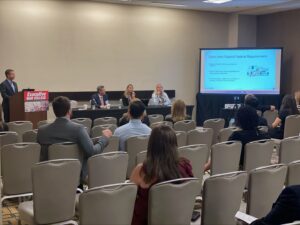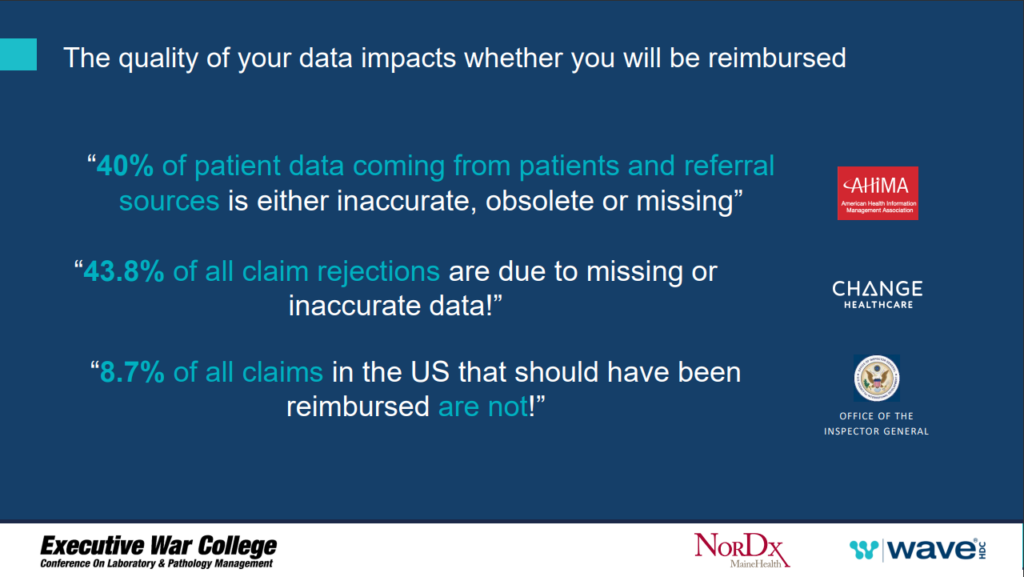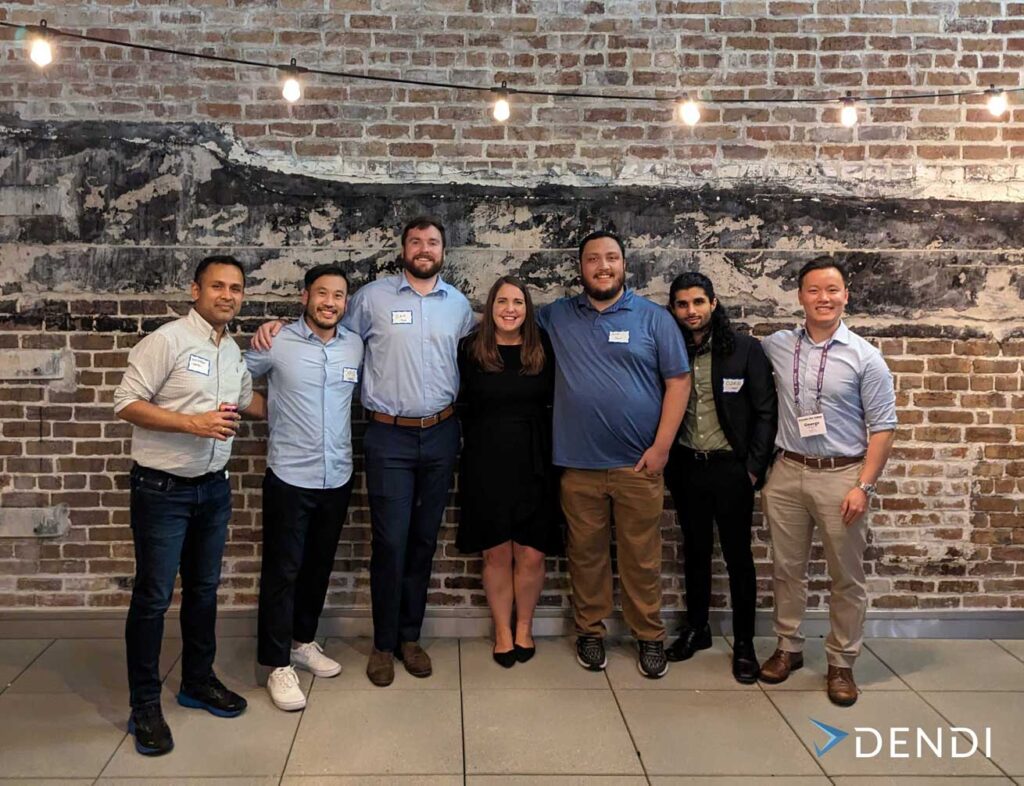Executive War College 2023 Recap


EWC 2023 Recap: A Premier Gathering of Clinical Diagnostics Thought Leaders
April 2023 – Dendi attended Dark Daily’s annual Executive War College (EWC) conference for diagnostic laboratories in New Orleans. EWC consistently delivers a well-organized event that provides a platform for industry experts, healthcare professionals, and innovators to gather in person and share industry knowledge that will shape the future of the diagnostic laboratory industry.
This year’s EWC was no different, attracting nearly 1000 attendees from various backgrounds. It presented a great opportunity for us to hear different perspectives about the most challenging issues in the diagnostics space today and discuss potential solutions. The Dendi team was active in attending panels and participating in networking events including our co-hosted casual cocktail party on Bourbon Street with our partners, AIMA and 1health. We’re thankful for everyone who connected with us and for all of the engaging conversations.
This is a recap of our experience at EWC 2023 to highlight some of our key discussions and share some of our insights.
The Key to Unlocking the Value of Data
“Data” is trending towards being valued as a precious commodity in healthcare. AI-powered solutions, machine learning, big data, and analytics were certainly hot topics at EWC, featured in such panels as: “Converting Data into Cash”, “Generating Value by Identifying Risk Signals in Longitudinal Lab Data”, and “Using Machine Learning and AI to Unlock the Full Value of Your Laboratory Data”. These panel discussions described the great potential for data-driven insights to improve lab operational efficiency and contribute to communal wellness and clinical research.
These topics are certainly exciting to us at Dendi, as we identify as a health tech company with a lab informatics product. However, some of these lofty aspirations are getting ahead of the market. Before labs can even consider extracting insights from their data they’ll need to access it first. The question we should first ask is “Do labs even have sufficient access to their data?”
Most clinical labs today are still running on legacy laboratory information systems that aren’t designed for practical data extraction. It is often the case that the best they can do is a data export to PDF or unstructured text, which is mostly unusable for data analytics or AI/ML applications. Very few LISs on the market are capable of providing structured data exports or easy ways to query for data such as via APIs. This also contributes to the many obstacles and costs of integrating with EHRs and other systems.
The potential value of healthcare data is indeed great, but labs need to modernize by choosing the technology infrastructure that enables them to unlock that potential.
Information Blocking Regulations are Coming
A topic that should give labs optimism is the advancement of protections against “information blocking”, presented in the panel, “Healthcare Data Interoperability: Opportunities for Labs and Updates on Federal Law, Regulation, and Enforcement,” (view video clip) presented by Greg Stein, CEO of Shadowbox, Sara Shanti and Paul Werner, Partners of Sheppard Mullin, and Alice Leiter, Counsel of Manatt Health.
The 21st Cures Act defines information blocking as, “a practice that interferes with, prevents, or materially discourages access, exchange, or use of electronic health information,” except as required by law or covered by an exception defined by the Secretary of HHS (more about information blocking). It can come in various forms, including anti-competitive behavior, illegal conduct, or terms of service that prevent the use of innovative technologies. The regulations also protect patient privacy and data security, ensuring that sensitive information is not shared without proper authorization and that it is transmitted securely. These regulations aim to improve patient outcomes by facilitating real-time data exchange among healthcare providers, reducing the need for paper documents and other outdated modes of communication.

Greg Stein highlighted several instances where incumbent companies deliberately practiced information blocking to impede competition. One such example involved an EHR company that declined to work with Shadowbox’s integration solution, claiming a violation of their terms of service. In another case, an integrations vendor provided a customer with significantly disparate price quotes (3x more for Shadowbox integration versus a direct EHR integration), even though the scope of work was essentially identical.
It is crucial for laboratories to have a clear understanding of their rights and to be diligent in contract negotiations to ensure that their legal rights are upheld. Furthermore, documenting any issues that arise and being aware of opportunities for public reporting and civil remedies can be vital in addressing information blocking. Similarly, healthcare companies must stay informed and adhere to evolving regulations surrounding data exchange to prevent potential legal repercussions resulting from information blocking practices.
As a forward-thinking healthcare solutions provider, Dendi also experiences information blocking when working with laboratories to transition from incumbent lab systems. Stifling progress with anti-competitive practices is a losing battle that hurts the entire industry and ultimately patients. With the COVID pandemic over, we are pleased to see the Cures Act resume its implementation, as it plays a crucial role in promoting health information interoperability.
Finding the Formula for Optimal Billing: Eligibility, Discovery, and Prior Authorization
Helping labs optimize billing processes is one of our core principles. So, the Dendi team set out to engage with many of the best in the revenue cycle management industry at this year’s EWC to learn about their current challenges. We met with professionals from AIMA, Telcor, WaveHDC, Gistia, ADS, Xifin, and Change Healthcare to discuss what it would take for labs to achieve better reimbursement results and also received feedback about how Dendi’s software solutions can help make the RCM process more efficient.
Trending revenue cycle solutions presented at EWC included AI and machine learning solutions for monitoring RCM processes and predicting outcomes, compliance programs, staying up to date with payor coding requirements, and automation for prior authorization requests. Prior authorization, in particular, is one of the hottest topics as labs are rushing to offer genetics, PGx, and molecular diagnostics. However, just about everyone we spoke to agreed that prior authorization may be the toughest problem to tackle – being more of a people and processes challenge.
Obtaining prior authorization is a laborious, time-consuming process with many points of friction. Labs don’t want to make it difficult for providers at the point of order to submit the prior authorization request, nor are they incentivized to do so. This leaves the onus on the lab to file the prior authorization request which can take days. This leaves the lab deciding whether they should run the test and risk not getting paid, or delay delivery of patient care.
According to the AMA, “Ninety percent of surveyed physicians reported that the prior authorization (PA) process delays patient access to necessary care. Forty-four percent of doctors say PA requests “often or always” hold up care. And those delays are often lengthy, with 26 percent of physicians saying that, in the prior week, they waited three business days or more on average to receive PA decisions from health plans.”
Not to mention, the costs of time and labor spent on prior authorization processing are unreimbursable and cause additional burdens on staff.
AIMA shared that it is fairly common for many labs to face rejections for up to 30% of their insurance claims. Just about everyone agreed that the root cause of all billing issues including prior authorization denials is, simply, inaccurate patient data.

The root cause of all billing issues is, simply, inaccurate patient data.
Performing insurance eligibility and discovery checks to verify patient data would seem to solve this issue, however, it’s important to consider the timing of when these checks are conducted. WaveHDC and AIMA both agree that checking for insurance eligibility and discovery at the point of order is an ideal approach. Fixing claims issues pre-emptively before they are submitted greatly improves first-time acceptance rates, and reduces denials and charge capture time.
We came across solutions from innovative companies that approach the solution to eligibility and patient data verification in different ways. 1health’s patient engagement portal enforces eligibility and prior authorization checks upfront at the point of order. Apollo Health Group offers insurance pre-check services that lead to an 85% success rate in collecting necessary documents within a 3-day turnaround time. These solutions, along with others, show great promise and cater to different use cases. It’s why we believe it’s crucial for us to maintain Dendi’s API suite, allowing labs to expand their capabilities by integrating with these and future solutions.
Dendi is constantly enhancing Dendi LIS to assist providers and lab staff in accurately capturing patient data with features like automated address correction, patient ID scanning, and document attachments. Furthermore, based on feedback from our RCM partners, Dendi now offers integrated point-of-order insurance eligibility and discovery checks. The consensus is that this integration will significantly improve the claims process and alleviate staff burden.
Closing Thoughts
While we are optimistic about all of the cutting-edge innovations presented, we firmly believe that labs should focus on the first steps to solving the fundamental problems: implement a modern LIS platform that provides interoperability capabilities and access to data, and institute processes and solutions to obtain valid patient data. Only then can labs move on from the “crawl” and “walk” stages and begin to “run” with newer solutions.
Dendi will continue to contribute to shaping the future of the diagnostic laboratory industry by driving innovation, promoting data interoperability, and providing cutting-edge software solutions that empower laboratories to deliver exceptional patient care.

Executive War College was a remarkable experience for the Dendi team. We’d like to extend gratitude to the Dark Intelligence Group for putting together an excellent event and also thank all of the industry experts and labs for engaging with us over several days to share their valuable insights and feedback.
Special Thanks to:
- AIMA
- Shadowbox
- WaveHDC
- Apollo Health Group
- 1health.io
- Change Healthcare
- Advanced Data Systems
- Gistia
Future-proof LIS software
for modern medical labs
Simplify. Integrate. Scale. Modernize your lab with Dendi today.
